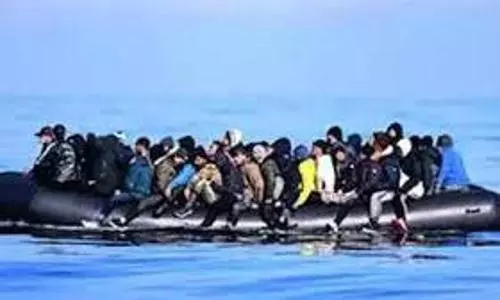
When the US and UK fight Houthis
text_fieldsEarlier this month, Houthi rebels attacked merchant ships in the Bab al Mandab (''the gate of grief''). This 45 km stretch of water lies between Yemen and Djibouti. 20% of the world's shipping passes through this strait because it is the approach from the Red Sea to the Suez Canal.
The United States and several other countries are very perturbed by Houthi attacks on commercial shipping. This could cause insurance premiums to jump. Much shipping might be diverted via the Cape of Good Hope – meaning longer voyages, delays in supply chains, increased fuel costs, rising inflation and cost of living. Moreover, it would also encourage other anti-Western forces to play the same game at other choke points such as in the Strait of Malacca or the Strait of Dover.
In January 2024 several nations proclaimed to the Houthis that such piratical attacks on the freedom of the seas would meet with swift and sure retribution if repeated. Heedless of this warning, the Houthis attack merchant ships yet again. Perhaps they thought that the proclamators were bluffing.
In retaliation, the USA and the United Kingdom have launched air strikes and missile strikes on Houthi bases in Yemen. These will likely be a pinprick. But the Westerners concluded that they must not make empty threats. If they do not follow up their bellicose rhetoric with action, then the Houthis will not be deterred.
Iran also seized a merchant ship in the Persian Gulf. The Occident views this as piracy.
The Houthis are a Shia group in Yemen. Shia comprise 35% of the Yemeni populace. They inhabit the mountain fastness of the west of the country. It is this natural fortress that has enabled them to hold out against the Sunni majority to the east and against Saudi Arabia to the north. The Houthis have some access to the sea, reason why they use their ribs (rigid inflatable boats) and other small craft to launch attacks. They fire cheap drones and rockets.
Insurgents in Yemen have provoked the USA for decades. The USS Cole was badly holed by a cheap rocket in 1998 and 14 sailors were killed. This was a humiliation that a warship that cost hundreds of millions of USD could be disabled so easily.
In the early 2000s, the United States contemplated intervention in Yemen. An Irish scholar Dr. Edward Burke wrote in the Irish Times: ''The United States ought to consider just how badly wrong this could go for them.''
The USA extracted itself from Iraq and Afghanistan with much pain and little glory.
The United Kingdom has cut back on its military for decades. The British Army is severely short-staffed. It is offering soldiers a month's salary to transfer to the Parachute Regiment. The Paras are the UK's spearhead force – supposed to be able to deploy anywhere in the world in days. The Gurkhas from Nepal have been part of the British Army and before that of the British Indian Army since 1814. The Gurkhas used to comprise 1% of the army. But London is now considering increasing it to 10%. As Nepal is one of the poorest countries in Asia, the British minimum wage is tempting. Gurkhas are guaranteed permanent residency in the UK if they complete at least 5 years in the British Army with good conduct.
The British cannot get their people to volunteer. Those who serve in the army often leave after a quinquennial contract because the salary and housing are substandard.
In 1990 the British Army had 150,000 troops. It now has 75,000 despite the UK population increasing by 20% in that timeframe. Britain's army has only 140 tanks. So much equipment has been donated to Ukraine. The once almighty British Army has been reduced to little more than a police force.
The UK's Royal Navy is also facing a recruitment and retention crisis. The Royal Navy (RN) has had to mothball two ships because it does not have enough sailors to man these vessels.
The RN allows women to serve at all levels. One idea is to have an all-female ship. The RN may have to recruit Nepali sailors. Land-locked Nepal does not have a navy and the Gurkhas used to detest sailing.
Much though the US might wish to fight, it is dubious as to whether it has the military strength to do so. The United Kingdom certainly lacks the capability to do so.
Biden's approval rating is shockingly low. It started to fall when he followed Trump's plan and withdrew US Forces from Afghanistan in August 2021. That was despite this being a popular move. It was the execution that went badly. The humiliating spectacle had shades of Saigon 1975.
Experience proves that when a US President launches air strikes this causes his popularity to undergo a rise. Biden could badly do with a bump in the polls. But this would soon fade.
The United Kingdom is often said to be the 51st state of the United States. The UK follows US foreign policy on many issues. British politicians often speak about the special relationship with the USA. Americans hardly ever mention it. Americans often say they have no truer friend than Israel.
The UK wants to keep the United States interested in the security of the rest of the world. There is a tendency towards isolationism in the USA. The British are keen that the United States continue to arm and fund Ukraine, because were the USA to withdraw all military and financial aid from Kyiv, then the Ukrainians would swiftly collapse before the Russian onslaught.
Trump is openly considering pulling out of NATO. There is a 40% chance he will be president again. For decades Western Europe spent very little on defence. They left it to the Americans do to all the heavy lifting. Since the Ukraine War, the Western European nations have rearmed but only a little.
The US and the United Kingdom perceive Iran as a hostile actor. The Iranians saved the Assad regime in Syria. Iran has been selling Shahed drones to the Russians. They have also taught the Russians how to circumvent sanctions. The Iranians have been under sanctions on and off for 45 years.
Western countries are transitioning to green energy. But that will take decades. In the meantime, they need oil and gas. They need access to the Middle East. They do not want Iran controlling more of it, for then Iran could hold them hostage in energy terms.
In 2021, Russia cut oil and gas supplies to Western Europe to very low levels. This drove up the world oil price. When the Ukraine War began, Russia tried energy blackmail. It could cut off all energy to the European Union (EU). Russia could switch off the heating in midwinter. The financial cost of weaning off Russian hydrocarbons has been painful for the EU but has not broken the EU. The EU has only been able to do so by purchasing oil and gas from the Middle East.
The Iranians do not want a full-scale war. But they would be a formidable foe. Iran has 85 million people, an enormous and very mountainous country. It has at least decent relations with all its neighbours. There are considerable minorities in Bahrain and the Eastern Province of Saudi Arabia of Iranian origin. Iran sits in a strategic location and could make shipping oil out of the Straits of Hormuz very perilous thereby driving energy prices sky-high.
The Iranian strategy is to slowly drive the US out of the Middle East. They have seen Uncle Sam hightail it out of Afghanistan and Iraq. They believe in inflicting the death of a thousand cuts. The USA lost only 3,000 fighters in Afghanistan over 20 years. For a population of 330 million that is very low. Iran regards the USA as a caitiff nation. A suicide bomber in Beirut killed hundreds of US Marines in 1985. The tough guy US President Ronald Regan immediately withdrew the US Military from the country. Somali warlords drove the Americans out of Somalia in 1993 while killing only a few dozen Yankees. The Iranians believe that the USA has no staying power.
Donald Trump may well pull out of the Middle East if he is re-inaugurated in January 2025. He is an 'America First' man.
Israel's war of terror against the civilian population of Gaza has galvanised the Muslim world. The slaughter of 22,000 Palestinian civilians has sickened all decent people. Iran likes to remind the Muslim world that they help Palestine more than anyone. It gives a lie to the notion that Teheran is anti-Sunni.
Iran would like there to be a linkage between the Houthi attacks on Western shipping and the Gaza attacks. The USA arms and funds Israel as well as vetoing any UN Security Council Resolution that would resolve the injustice inflicted on Palestine. Iran's argument is that the illegal occupation of Palestine should be solved at source. As the USA is the armourer and treasurer of Israel and a cheerleader for these crimes against humanity, then the USA must pay a very heavy price. Then US support for the Zionist entity shall diminish commensurate with this suffering.
The United Kingdom has also applauded Netanyahu's crimes. Sunak even flew to Israel to commiserate with Netanyahu after the 7 October attacks. Sunak has no words of comfort for the Palestinians who have been killed – twentyfold more than the Israeli civilians who were killed. Other Western nations also sell arms to Israel and at least trade with it. Germany arms Israel to compensate them for the Holocaust. That is a small consolation to Palestinian civilians who are massacred today.
Sunak will be gone later in 2024. The Labour Party will form the government of the UK. Labour leader Keir Starmer will be Prime Minister. But Starmer also has advocated action constituting crimes against the beleaguered people of Palestine.
The Sunni world has not reacted with horror to Houthi attacks. Much though they may not like the Houthis, they cannot disagree with their argument that the Western world must be brought to its senses regarding Israel.
The retaliatory raids on Houthi positions are supposed to warn them off. But there is no prospect of intervention. There is no appetite for boots on the ground among the public in any Western nation.
Trump reintroduced sanctions on Iran in 2017 despite Iran abiding by the Iran Deal scrupulously. Biden has continued sanctions. Ending these sanctions could de-escalate Middle East conflicts and convince Iran to stop arming Russia. But Biden does not appear to even contemplate such a scenario.
In the 1860s the British acquired the Yemeni port of Aden. The British did not concern themselves overmuch with the hinterland. The Britishers signed treaties with local chieftains. They were content to let these feudals run their fiefdoms as they had done since time immemorial.
Aden was soon the most prominent port in the southern Middle East. It served ships both headed for the Red Sea and the Cape of Good Hope as well as those bound for the sub-continent and the Far East. It was a major entrepot and a surprisingly cosmopolitan place. There have been Jews in Yemen since the 2nd century CE. They lived in peace with their Ishmaelite neighbours from whom they were all but indistinguishable. Yemeni Jews even practised plural marriage. There were also merchants from India in Yemen and some were Hindus and even Zoroastrians. People from Africa also settled there.
The British built Aden into their colony which they called South Arabia. The Ottoman Turks ruled the land to the west which had its capital at Sana'a.
The Ottoman Empire was dissolved by the Treaty of Sevres in 1920. The formerly Turkish-ruled zone in Yemen became known as North Yemen although it was more accurately the west of the country. The British colony continued.
In the 1960s Arab nationalists in South Arabia revolted against Britannic dominion. The Britishers in 1964 proclaimed that they would withdraw in six years. In fact, they pulled out from five. The Yemeni rebels did not trust London and fought an insurgency against the British and killed 60 British soldiers in those years.
In 1969 the Brits, true to their word pulled out. The quondam colony became known as South Yemen although it again was a misnomer as it was more the east of the country than the south. South Yemen came under Marxist rule and was aligned with the Soviet Union.
Aden swiftly went to the dogs. Anyone who was not Yemeni left. Aden had been the Dubai of its day. The Jewish community almost entirely decamped for Israel.
Air India flew a plane crewed exclusively by Parsees to remove a sacred Parsee flame from a fire temple in Aden and convey it to Bombay.
Yemen has been in a civil war for over a decade. It is a proxy war between the Kingdom of Saudi Arabia (KSA) and Iran. Saudi backs the Sunni majority Government of Yemen. KSA has been launching air strikes on the Houthis for years. This met with little success and slew many civilians. Yemen is the poorest country in the Middle East and was cut off from adequate food and medicine for years. Many, many civilians have been killed by the KSA.
The Houthis have become adept at minimising risk. They spread their assets widely. Therefore even a successful Saudi air strike would destroy only a small amount of their valuable equipment.
In 2023 the KSA and Houthis agreed to a truce. The Saudis and UAE have found this war costly and difficult. They have no wish to restart it. Uneasy peace in Yemen allowed Iran and the KSA to re-establish diplomatic relations.
Iran and the KSA have been fighting a proxy war in Syria since 2011. Though Syria is a forlorn hope for the Saudis – Yemen is not. Yemen borders the KSA so the Saudis were very worried about a Shia state on their southern frontier.
The Houthis were lightly armed. They relied on small arms, mortars, machine guns, roadside bombs and mountain artillery. They relied on speed and surprise. They practised guerrilla warfare using hit-and-run tactics. They could not fight a pitched battle with the Yemeni Army which is a conventional army even though it is somewhat poorly equipped and indisciplined.
When Somali pirates in the 2000s attacked ships off the coast of East Africa, naval ships from France, the USA, India, Pakistan and even the Republic of Ireland participated in anti-piracy patrols. Some pirates were slain and some pirate boats were sunk. Freedom of navigation is a core principle of international law. It is in the interest of all civilised nations that trade continues unimpeded.
The Houthis ought to have expected a strong response.























